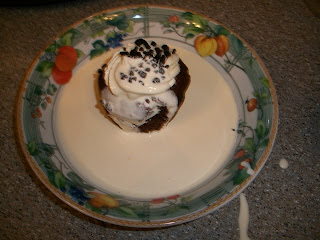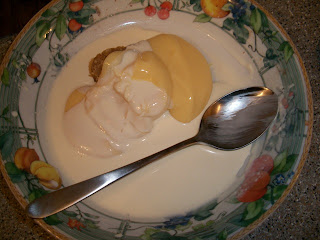 I once again I have thrown myself to the bottom of the health ladder and am currently clawing my way back from non-Paleo, through pseudo Paleo towards proper Paleo.
I once again I have thrown myself to the bottom of the health ladder and am currently clawing my way back from non-Paleo, through pseudo Paleo towards proper Paleo.Last weekend, it was my friend’s birthday party. We live in society in which celebration is inextricably bound to food and alcohol. The significance of the former is usually signified by the volume of the latter. Accordingly, the itinerary for this party saw the revellers hitting a cocktail bar valiantly early, after which, a few hours later, a restaurant. Then, one of our friends hosted the rest of the night at his house, where the breathtakingly well-stocked drinks cabinet was seemingly incapable of depletion.
The night was a reminder of how social triggers usually precipitate my binges, and how alcohol seems to play a physiological as well as a psychological role; as well as the drunken state eroding will power at the time, the hangover later creates sugar and salt cravings.
Yet the following day it was evening before I was able to muster the energy and stomach space for food. Great – a 24 hour fast, I hear you say; but if my last meal the day before was eaten at midnight, and I continued to drink calorie-crammed alcohol through most of the early hours of the next morning, I suspect I don't qualify for much praise.
Thus, at 8pm, a rag bag trio of casualties (Mrs M, a fellow party-goer and me) summoned the strength of will to attend our local Chinese restaurant – what better way to satiate those hangover urges than with that heady mix of salty and sweet of food.
Before the weekend, I had resolved to eat healthily the night after the party. As we traipsed up the road to Wong’s, I inwardly chuckled at my naivety.
After half a bottle of wine, a crispy duck and a plate of chicken and cashew nuts, I was ready to put the final nail in the coffin. On the way home, as we rolled past the local supermarket, I dodged in to grab a couple of slices of cheesecake. Back at home, these were quickly devoured and I stumbled into bed soon afterwards, where no doubt this grotesque cocktail of poisons slowly fermented in my outraged gut.
The next day started well. Loosely following my three-day binge recovery plan, I planned to eat low carb, mostly Paleo, but not worry about volume. I would ease my way out of the binge mentality with Paleo treats. I took a couple of fat-laden free-range pork chops out of the freezer, laying the groundwork for a tasty Paleo evening meal.
For breakfast, in spite of not being sure whether I was genuinely hungry, I feasted on coconut cream, fruit, nuts and cocoa powder:
But by lunch, I’d been gripped by the need to indulge. Nut butter, my normal, pseudo Paleo crutch, was somehow not offering what I needed, so I bought a block of cheese, rationalising that
at least it’s low carb and, according to some, the least bad dairy option.
I also bought some smoked mackerel fillets.
Thus, my lunch, eaten semi-hungry, was this:
Make no mistake – this was a lot of food. I could probably have comfortably survived until dinner the next day on this alone; but a couple of hours later I found myself being offered chocolate cake by my friend whose birthday we had celebrated at the weekend. It had to be finished, after all. Two slices later, all hope of having an appetite for the pork chops was gone.
Yet emotionally I was already locked into the pork chops. With Mrs M away that week, dinner in front of the TV was to be the highlight of the evening.
And so, in spite of a complete lack of hunger, I later devoured both pork chops, along with broccoli drowned in melted cheese:
It had been important to finish the cheese so I could eat clean the next day. This is, of course, nonsense - I could have wrapped the cheese up and simply not eaten it the following day. I then finished off with some chocolate eggs Mrs M had left lying around; I had already eaten chocolate cake earlier, so it ‘made no difference.’
I’ve already messed up today anyway
and
So that I can make a clean start tomorrow
... are two of the most frequently used rationalisations in our house.
The following day, I fasted until lunch, when I was meeting birthday boy. Today was going to be 100% Paleo. From the menu, I selected a half roast chicken; but I forgot to ask them to hold the fries and instead of changing my order, rather slyly convinced myself I would leave the fries on the side of the plate.
When the food arrived, at first I did indeed avoid the fries; but when my friend offered me a breaded onion ring, I obeyed. Then I dipped a piece of chicken into his sour cream dip. I was clearly daring myself to have another day of eating garbage - and before long I’d decimated my fries, half of his fries and a fistful of those frightful sauce sachets, ranging from ketchup to mayonnaise.
From the pub we proceeded directly to the cake shop, where we bought one fruit tartlet each. Mine was gone in seconds. I could have eaten another without blinking, but already birthday boy was balking.
“You’re not even in the same league, are you?” said I, by now resigned to another day of dietary self-destruction.
Back in the cake shop, I acquired a blackberry and apple turnover...
... and finally, some chocolates to finish:
That evening I ate homemade soup. Even I have my limits, and no amount of rationalisation would have convinced me to shovel any more crap on top of the mound of filth now festering in my intestines.
For the rest of the week I was pretty good, though I still hadn’t yet got my moderation mojo back. I was eating Paleo meals that were too big then binging on nuts.
Finally, on Friday, I pulled a perfect Paleo day out of the bag. These were the highlights:
- 9 minutes intense interval training
- 60 seconds of very cold shower
- Fasted all day until dinner
- Drank only water and herbal tea
- Organic chicken with roasted vegetables for evening meal
Then, last night, just as I was about to escape the orbit of planet binge - engine trouble. One too many wines, and I lost the plot. The primary rationalisations this time were
well I haven’t really recovered from the last binge, so layering another day on top will make little difference
I can start afresh next week
I think the photos speak for themselves.
I have become finely tuned to the effects of eating bad food, so had no trouble connecting the post-binge puffy eyes, lack of alertness, uncomfortable guts and morning grogginess with the non-Paleo lapses of the last 18 months; but apparently these consequences are not enough to deter me.
That’s why I need to get ill. I think this would put me off – or at least reduce the frequency.
Since the start of last year, I have not had so much as a cold. Is it the vitamin D supplementation? Or perhaps the post-binge super-Paleo days like Friday? Maybe it’s the Paleo eating I do the rest of the time. Maybe all of them. Whatever the reason, it seems too easy. I need to be taught a lesson.... Read more
























